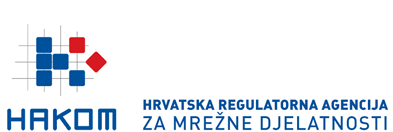ZAGREB, January 17, 2018 The Croatian Regulatory Authority for Network Industries (HAKOM) hosted the fifth meeting on the topic of market regulation for electronic communications, postal and rail services bringing together stakeholders, ministries, state institutions, the economy and the media. The traditional, HAKOM's "Market Day" is a gathering organized by this national regulatory authority once a year with the aim of further enhancing the regulatory framework for investment into the modernization of electronic communications networks and the implementation of new services on the markets regulated by HAKOM while simultaneously maintaining market competition. The most important activities on the markets regulated by HAKOM were presented at the meeting as well as HAKOM's objectives and tasks in the future period.
Introductory presentation on the topic "Where have we gone? Where shall we reach ? And when?” was held by Dražen Lučić, President of the Council at HAKOM who emphasized that the historically largest operators’ investments over the last three years have led to a significant increase in the density of broadband Internet access, especially at the speeds of 30 Mbit / s, which contributed directly to the economic development increasing the gross social product and creating good foundations for the development of digital economy and information society in the Republic of Croatia as part of the unique digital market of the European Union. The socially responsible management of the radio spectrum as a limited natural resource of the Republic of Croatia has resulted, along with the operators’ investments, in technologically modern mobile communications networks, thus being the best in the EU according to the quality, ultimately resulting with about 4 billion HRK in state budget over the last five years, Lučić said.
In addition to the introductory presentation by President of the Council at HAKOM other presentations we held by Jiří Dvorjančanský, CEO at Vipnet and Davor Tomašković, President of the Management Board and CEO at Croatian Telecom. In the work of the roundtable on "How prepared are we for the challenges of the EU Single Market?", The panellists were Bernard Gršić, State Secretary at the Central State Office for Development of Digital Society, Ivan Barać, Special Advisor to the Deputy Prime Minister of the Government of the Republic of Croatia in the Ministry of Economy, Entrepreneurship and Crafts, Igor Radić, Advisor to the Minister of the Sea, Transport and Infrastructure and Viktor Pavlinić, Vice Chairman of the Board of Directors of the Association of Foreign Investors and CEO at Tele2, and the work of the round table was moderated by Marko Čavlović, Assistant Director at HAKOM. At the panel discussion there was topic on how much the Republic of Croatia is ready for the digital economy and what are market participants expectations as well as their plans and priorities or key business decisions and investments in the upcoming period.
!!!xGALERIJAx!!!
# # #
For additional information please contact:
Croatian Regulatory Authority for Network Industries (HAKOM)
Roberta Frangeša Mihanovića 9
10110 Zagreb, Croatia
Tel. + 385 (0) 1 700 70 07
Fax + 385 (0)1 700 70 70
Media inquiries can be submitted online using HAKOM’s official website:
Registration required.
ABOUT HAKOM: HAKOM (www.hakom.hr) - Croatian Regulatory Authority for Network Industries – ensures preconditions for a fair market competition, stable growth and environment for innovations in the electronic communications and postal services market. HAKOM protects users’ interests and the possibility of choice among various communications and postal services at affordable prices, defines sustainable competitive conditions for operators and service providers under fair conditions for return on investment, and provides support to economic growth, public services and the quality of life in the Republic of Croatia by using modern technologies. HAKOM’ strategic goals are: to promote regulation of the electronic communications and postal services market, to support growth of investments and innovations in the electronic communications and postal services market, to provide efficient use of limited resources, to accelerate the growth of broadband products and services, to provide affordable offers of communications and postal services, to provide protection and informing of users, to build an efficient and comprehensive information system, to define and implement efficient processes, and to acquire multi-disciplinary competencies in market regulation.

